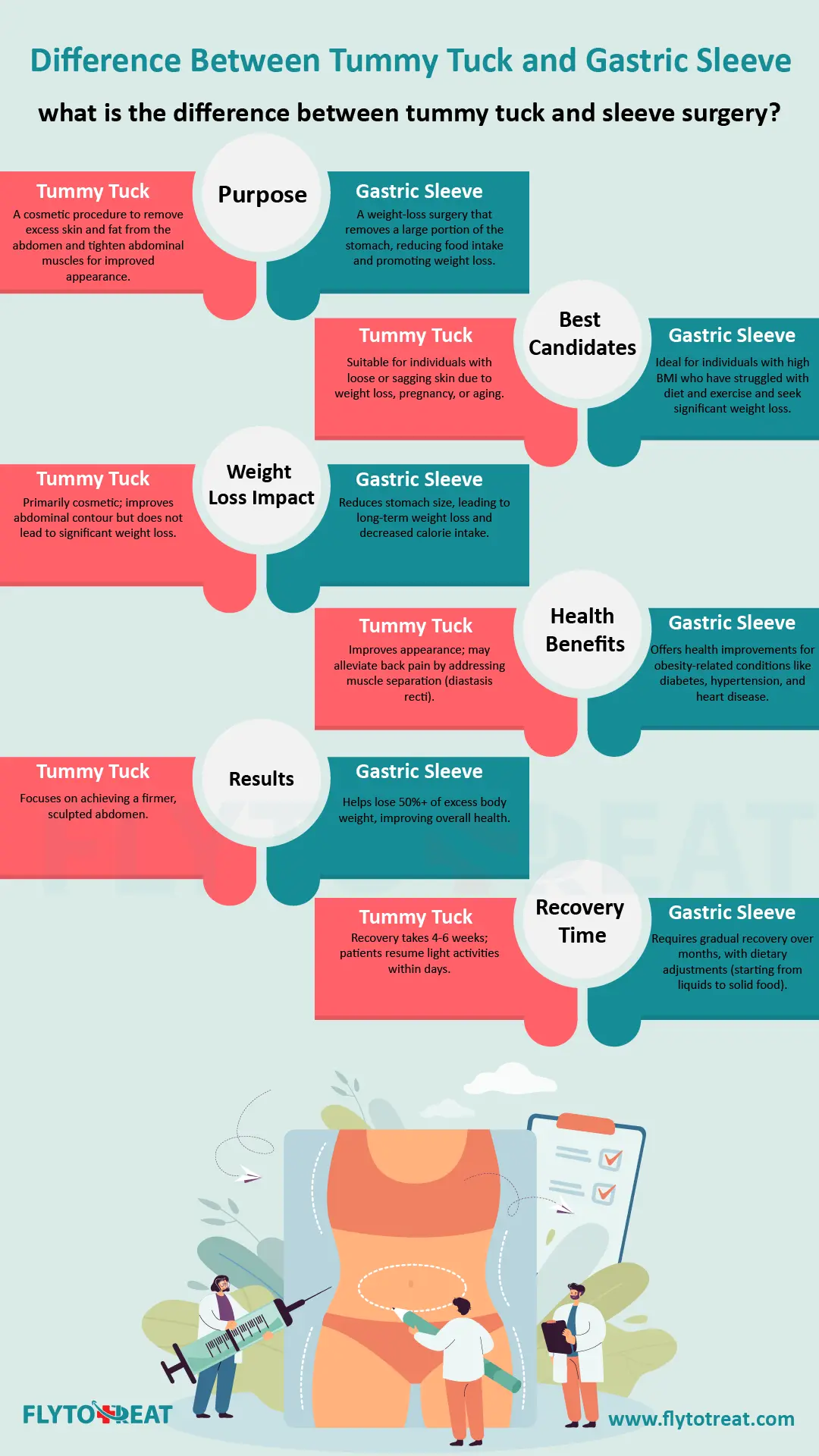
sleeve surgery vs tummy tuck
When considering sleeve surgery vs tummy tuck, it’s important to understand the unique benefits and purposes of each procedure. This article provides a comprehensive comparison to help you make informed decisions. Questions like "Can you have a tummy tuck after gastric sleeve?", "How soon after gastric sleeve can I get a tummy tuck?", and "Is a tummy tuck better than a gastric sleeve?" will be addressed. FlyToTreat aims to guide you through these options, ensuring clarity in your choices.
What is a Tummy Tuck?
A tummy tuck, also known as abdominoplasty, is a surgical procedure to improve the appearance of the abdomen. This procedure involves:
• Removing excess skin and fat: Surgeons remove surplus skin and fat from the abdominal area, often resistant to diet and exercise.
• Tightening abdominal muscles: The underlying muscles are tightened, creating a firmer and more toned appearance.
• Enhancing body contour: The procedure significantly improves the overall contour and profile of the abdomen, providing a smoother and flatter midsection.
Consider a tummy tuck if you have loose abdominal skin from weight loss, pregnancy, or aging. Especially helpful after weight loss surgeries.
While discussing sleeve surgery vs tummy tuck, it's essential to note that a tummy tuck focuses on skin and muscle tightening. In contrast, sleeve surgery is a weight loss procedure. Understanding the differences in procedures such as tummy tuck vs gastric sleeve helps patients make informed decisions based on their aesthetic and health goals.
What is Sleeve Surgery?
Sleeve surgery, also known as sleeve gastrectomy, is a bariatric procedure designed to aid in weight loss by reducing the stomach size. This procedure involves:
• Removing a portion of the stomach: Approximately 75-80% of the stomach is surgically removed, leaving a banana-shaped "sleeve."
• Restricting food intake: The reduced stomach size limits the amount consumed, significantly decreasing calorie intake.
• Reducing hunger hormones: The surgery also decreases the production of ghrelin, the hormone responsible for hunger, helping patients feel full faster and for extended periods.
Sleeve surgery is for those with a high BMI (over 40) or BMI over 35 with weight-related health problems. It's suitable for those struggling to lose weight with diet and exercise. When comparing gastric sleeve surgery vs tummy tuck, it's important to note that sleeve surgery is primarily for weight loss. In contrast, a tummy tuck is a cosmetic procedure that improves abdominal appearance. Understanding the differences between tummy tuck vs gastric sleeve and sleeve surgery vs tummy tuck can help patients make informed decisions about their health and aesthetic goals.
Difference Between Tummy Tuck and Gastric Sleeve
Understanding the difference between tummy tuck and gastric sleeve is crucial for individuals considering body contouring or weight loss procedures. Both surgeries serve different purposes and offer unique benefits. However, they can not be replaced. They differ in purpose, candidacy, health benefits, recovery time and consequently in their results. You need to understand these differences so you can choose what works best for you. Here is a disclaimer; you can not choose the right type of surgery by your own. Please contact our professional consultants so they help you decide.
What is the purpose of Sleeve Surgery vs Tummy Tuck?
One of the fundamental differences between gastric sleeve vs tummy tuck is their differences. Also known as abdominoplasty, this is a cosmetic procedure aimed at removing excess skin and fat from the abdomen and tightening the abdominal muscles to enhance appearance. Sleeve gastrectomy, on the other hand is a surgical weight-loss procedure in which a large portion of the stomach is removed, resulting in the shape of a sleeve or tube. This restriction of the stomach's capacity leads to a reduction in food intake and helps in achieving significant weight loss. Additionally, the procedure is believed to cause hormonal changes that decrease feelings of hunger.
Who are the best candidates for gastric sleeve vs tummy tuck?
Since the purpose of gastric sleeve vs tummy tuck are different, their candidates are dissimilar. While a tummy tuck is Ideal for individuals with loose or sagging abdominal skin due to weight loss, aging, or pregnancy a Gastric Sleeve is suitable for individuals with a high body mass index (BMI) who have not achieved weight loss through diet and exercise, this option may be considered for those looking for alternative methods to manage their weight.
Here you can see Who should not get a tummy tuck.

What about Weight Loss after gastric sleeve surgery vs tummy tuck?
Unlike tummy tuck sleeve gastrectomy is ideal for individuals seeking significant weight loss. By reducing the size of the stomach, it leads to decreased food intake, and ultimately facilitates long-term weight loss. Tummy Tuck is primarily a cosmetic procedure. it targets excess skin and fat in the abdominal area but does not contribute significantly to overall weight loss. Abdominoplasty, commonly known as a tummy tuck, is often sought by individuals who have lost a significant amount of weight, gone through pregnancy, or simply want to achieve a firmer abdominal contour.
What are the health benefits of sleeve surgery vs tummy tuck?
Gastric Sleeve Provides substantial health benefits, including improvements in obesity-related conditions like diabetes and hypertension. Provides substantial health benefits, including improvements in obesity-related conditions like diabetes and hypertension. This is because gastric sleeve surgery restricts calorie intake and reduces the production of hormones that contribute to these conditions. Tummy Tuck Enhances physical appearance by creating a firmer abdomen but does not directly improve health conditions. In some cases, however, a tummy tuck can address diastasis recti (separated abdominal muscles), which can cause back pain. Tightening these muscles during the procedure may offer some relief from back discomfort.
How tummy tuck vs gastric sleeve results differ?
This cosmetic procedure primarily addresses loose skin and weakened abdominal muscles. It removes excess skin and tightens the underlying muscles, resulting in a firmer, more toned, and sculpted abdomen. However, it does not directly affect overall body weight. On the contrary, sleeve gastrectomy is a weight loss surgery that focuses on achieving significant and sustained weight loss. By restricting the size of the stomach, it reduces food intake and promotes feelings of satiety. This leads to substantial weight loss, often exceeding 50% of excess body weight. This weight loss can significantly improve overall health and reduce the risk or severity of obesity-related conditions like type 2 diabetes, sleep apnea, and heart disease.
How is recovery for Gastric sleeve vs tummy tuck?
Recovery time for a tummy tuck can vary depending on the extent of the procedure and individual factors. However, most patients can generally return to light activities within a few days and gradually resume normal activities within 4-6 weeks. On the other hand, recovery from gastric sleeve surgery involves a more gradual process focused on adjusting to a smaller stomach and new eating habits. While the initial hospital stay is typically brief, full recovery can take several months. Patients will follow a specific dietary plan starting with clear liquids and gradually progressing to soft foods and regular meals. This allows the stomach to heal and adjust to its reduced size.
Is a Gastric Sleeve Better Than a Tummy Tuck?
Determining whether a gastric sleeve is better than a tummy tuck depends on individual goals and needs. If you face severe challenges with obesity and it is influencing your overall health, you should consider gastric sleeve surgery, but a tummy tuck does not help you in that case. On the contrary, as we mentioned before, when you want to remove your excess skin in abdominal region a tummy tuck is better than gastric sleeve and that is because sleeve gastrectomy’s purpose is fundamentally different.
Please see the Difference Between Tummy Tuck and Gastric Sleeve in this article to fully understand what is these surgeries differences.
Ultimately, when comparing tummy tuck vs gastric sleeve, aligning the choice with personal health and aesthetic goals is essential. Combining procedures, such as a tummy tuck after sleeve surgery, may be the most beneficial approach for some.
Will I Need a Tummy Tuck After Gastric Sleeve?
After gastric sleeve surgery, many patients experience significant weight loss, which can lead to loose or sagging skin around the abdomen. A tummy tuck may be needed to remove this excess skin and improve abdominal contour. It's recommended to wait 12-18 months after weight loss surgery before considering a tummy tuck to ensure weight stabilizes. Discussing with a plastic surgeon helps determine the right time for a tummy tuck after sleeve surgery. Knowing the differences between gastric sleeve surgery vs tummy tuck is crucial for making informed decisions.
Can You Get a Gastric Sleeve and Tummy Tuck at the Same Time?
Undergoing gastric sleeve surgery and a tummy tuck simultaneously is generally not expedient. Combining these procedures can intensify surgical complications. Having the gastric sleeve first is recommended, allowing time for significant weight loss and stabilization. If you ask, "How soon after gastric sleeve can I get a tummy tuck?" A tummy tuck after sleeve surgery can be considered 12-18 months post-weight loss when weight has stabilized. comprehension of sleeve surgery vs tummy tuck assists in planning a secure and effective treatment string for optimal results.
Conclusion
In conclusion, understanding the differences between a tummy tuck and gastric sleeve surgery is crucial for making informed decisions about your health and body goals. Whether you're looking for significant weight loss or to improve the appearance of your abdomen after weight loss, FlyToTreat provides the necessary insights. Remember, it's often advisable to wait until your weight stabilizes post-gastric sleeve before considering a tummy tuck. Always consult with your healthcare provider to determine the best course of action for your needs.
MEDICALLY REVIEWED BY: Dr. Ali Bazazi
AUTHOR: FlytoTreat's team of Authors
22 July 2024 - Updated At: 11 December 2024
Related Articles
Comment




